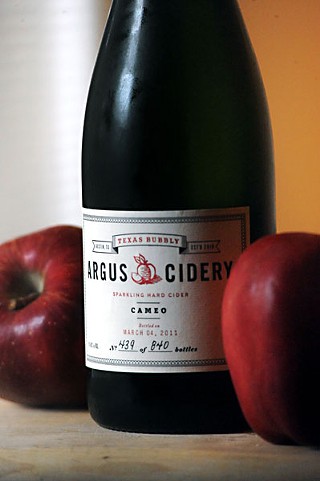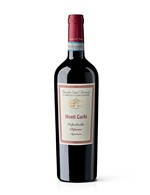Austin Cider Houses Rule
Is hard cider ready to make a historic comeback?
By Wes Marshall, Fri., Dec. 30, 2011
People will always find a way to make alcohol, and they'll generally use what's handy. If there's lots of wheat and barley and hops, then beer appears. If grapes are growing wild, wine comes shortly thereafter. That's why hard ciders historically came from areas where apple trees were plentiful, like the UK, northern Spain, and the northeastern U.S. But adventurous tasters are looking for new drinks, and suddenly, even here in Central Texas, hard ciders are becoming quite popular. Not only are we seeing more imported and domestic versions at bars, restaurants, and stores; we also now have two cider-makers right here in Austin: Austin Eastciders and Argus Cidery. And thankfully, we're not just seeing the same oversweetened, headache-inducing, beer-on-training-wheels carbonated beverages. We're seeing some serious drinks aimed at people with urbane taste buds.
We asked David Alan, the Tipsy Texan: Why the changeover? He immerses himself in cocktail and spirit education and has been following the new ciders with some interest. "Adult artisanal ciders are so new," he told us. "We've always seen sweet ciders on tap for people who can't stand a beer, but now that these more sophisticated ciders are hitting the market, I think everyone's opinion will change. A lot of us burned ourselves out on the sweet ciders when we were young, but all the local food, local beverage, old food arts movements that are going on right now – it's kind of inevitable that good hard ciders would pop up in Texas."
Ed Gibson, owner of Austin Eastciders and a cider bar in Bristol, England, and a hyperfan of all things Austin, agrees that there's a renaissance afoot. "What Argus Cidery, we, and a few other very small regional producers are doing is the first beginnings of modern-day craft cider production in America," he said. "Compare it to the craft beer explosion. The cider your average reader has tried up until now is the equivalent of the big industrial brewers. If they didn't like it, that doesn't mean they don't like cider; it just means they don't like shit cider!"
A Little History
You might wonder why there isn't much American cider production. Up until about 1840, cider was the dominant alcoholic drink among the American populace. As Alan quipped, "Johnny Appleseed wasn't planting apples just to eat." Then, a confluence of events stopped the beverage dead in its tracks (for a fascinating paper on the subject, see "The Mysterious Demise of Hard Cider in America" by David Williams, an English professor at George Mason University: mason.gmu.edu/~drwillia/cider.html). The main problem was that cider ended up in a bare-knuckle cage fight with beer, and that fight coincided with an influx of German and Czech immigrants, every one of whom seemingly knew how to craft a very nice beer. And apple trees take 10 years to grow, while beer's component parts could be grown annually. Plus, lots of people made cider at home as a way to extend the nutritive value of the apples throughout the year. But as people moved to cities, beer became cheaper and folks no longer had a personal orchard to work with. Something bigger, perhaps even nefarious, happened, because in England, Spain, France, and Canada, happy imbibers continued to drink both cider and beer – it's only in the U.S. that we stopped drinking cider. Williams postulates that the big beer-makers may have systematically bought up the cider-makers to shut them down.
As apple production moved to eating rather than drinking, apple growers began to concentrate on specific varieties and ultimately, as the industry corporatized, lots of heirloom varieties all but disappeared. Alan is hopeful that as consumers try different ciders, they'll start showing interest in old and rare types of apples. "If cider takes off, it will be so much better for the genetic diversity of apples," he explained. "Hopefully, we'll get a more diverse apple crop than we have been, and people will start to pay attention to the heirlooms." Gibson wants to take an active role in repopulating American orchards. "Our mission is to recultivate the incredible old Southern cider apple varieties like Horse, Hewes, Harrison, Yates, maybe even [Thomas] Jefferson's long lost legendary Taliaferro cider apple," he enthused. "We will be undertaking a monumental road trip around the U.S. in January, searching out these varieties and talking to apple growers in the South that we hope to partner with to start growing them again."
One other piece of intrigue that has had some impact on the "apple juice into alcohol" story: For taxation and regulation purposes, the government defines "cider" as something made from fermented apple juice that produces less than 8% alcohol. If it's above 8% but below 14%, it's apple wine. So, commercially, what do you call it, cider or wine? Of course, the word "wine" raises the unfortunate connotation of Boone's Farm, but there you are. From the standpoint of processing the fruit, the term "wine" may be more appropriate than cider anyway. "The process of making cider is exactly the same as winemaking," Wes Mickel, owner of the local Argus Cidery explained. "There is no heat involved like beer. People think it's like beer, but it's really made like wine, trying to preserve all of the delicate aromas and flavors." Mickel works full-time at Whole Foods, where he's the senior chef instructor. He moved here three years ago from San Francisco, where he made ciders for his own consumption and also launched a winemaking company with a friend and produced a wine that received a 92 in Wine Spectator, so he knows what he is talking about when he says that many of the talents for making wine and making cider are interchangeable.
Cider-Making Comes to Austin
Bill Norris is the beverage director for the Alamo Drafthouses, which are dependable outlets for good-quality ciders. We asked him why the Alamo featured them so prominently on its menu. "Two components," he said. "One is it's gluten-free, so if our customers can't drink beer, they gravitate towards it. Second, people who don't like beer find that its delicious, dry apple flavor is really appealing. Also, I really like both of the Austin ciders. I'm impressed with the whole idea of the Eastcider, which takes that English tradition and marries it to the old American heirloom ciders made from local apples around Texas and the South. His cider is less dry than the Argus, but they show how versatile the idea of cider can be. There's a spectrum of flavors and profiles, similar to what the craft brewers do with beer. We're excited to see what happens with them in the future."
Gibson thinks there is one hurdle facing both companies: "Cider has been seen as a girl's drink here for a long time, but in England it's a real full-bodied man's drink. We do need to break down this fallacy, so guys are a real target market for us. One style we will be producing is a very traditional, strong, cloudy cider, a massive mouthful of flavor, the kind of cider that the original settlers drank. That's what we want to take things back to. I really want to get beer drinkers drinking robust styles of cider." Eastciders' entrée into the Austin market is its Gold Top Cider ($8). It's a barely sweet beer-drinker's cider made from a combination of Texas dessert apples and vintage English cider apples. Gibson's partner made it in the UK. "This style of cider is so different from that which Americans are used to," he told us. "I had to prove there was a market for it before I could hope to get the money together to set up a production facility here. I believe in the modern parlance they call this 'bootstrapping!'" Not to worry – Gold Top is selling beyond anyone's expectations.
The Argus Cider is much closer to a bottle of fine Champagne. In fact, the first time we tried it, it was immediately following a similarly priced $20 Cava. I have to admit, I had low expectations and was instead literally amazed that the Argus had all the bubbly mouthfeel, cleansing acidity, and wonderful aromas we got from the Cava, and the Argus was even drier. Given the fact that the finest Champagnes are often described as having apple-like aromas, the fact that the Argus literally did have apple aromas was a very nice plus. It was so good we put the Cava back in the fridge and finished the Argus. We even found the Argus' ideal food pairing when we noticed how flawlessly it went with picante peppers. It's a perfect partner with the Jalapeño Apple Crisp Pie at R.O.'s Outpost B-B-Q in Spicewood! Mickel beamed when he heard our feedback. "Look, I'm 100-percent a food guy," he said. "Anything I do in beverage is just for fun. But I got so excited when I moved to Austin because when I got here I contacted all these Texas apple growers, and honestly no one was making cider from their apples. So I tried some out, and many of Texas' apples are, like, perfect for cider. Now I'm getting them from Medina, Farwell, Lubbock, and some other areas. We just want to learn more about growing apples so we can understand them better and make better sparkling cider. We're really thrilled about the future."
So are we!
Argus cider is available at Whole Foods Lamar and Gateway, Whip In, Antonelli's Cheese Shop, and Twin Liquors in Bee Cave. Eastciders' Gold Top is sold at Longbranch Inn, the East Side Show Room, the Grackle, Whip In, Foreign & Domestic, Haddingtons, Alamo Drafthouse (Lamar and Lake Creek locations), East 1st Grocery, Royal Blue Grocery on West Fourth, the Sunrise Mini Mart on West Anderson, the Hyde Park Market, and Hopfields.










